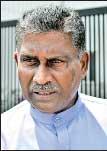Reply To:
Name - Reply Comment
 By Awarjitha Edirisooriya
By Awarjitha Edirisooriya
|
Senior Professor Amal S. Kumarage University of Moratuwa, Faculty of Engineering Department of Transport and Logistics Management |
|
|
Gemunu Wijeratne Chairman Lanka Private Bus Owners’ Association |
|
|
Shashi Welgama |
 When it comes to public transportation in Sri Lanka, bus transportation is very popular among people. But investigations done by the Daily Mirror revealed that the services provided by many buses plying on popular routes have been stopped. Road Passenger Authority of Western Province General Manager Jagath Perera revealed to the daily mirror that after Covid 19 fifty one bus routes have been cancelled in the Western Province.
When it comes to public transportation in Sri Lanka, bus transportation is very popular among people. But investigations done by the Daily Mirror revealed that the services provided by many buses plying on popular routes have been stopped. Road Passenger Authority of Western Province General Manager Jagath Perera revealed to the daily mirror that after Covid 19 fifty one bus routes have been cancelled in the Western Province.
It was a Monday morning and the buses plying the178 and 145 routes were fully packed while the bus plying on the155 route was parked beside the road.
Sunethra, who is a resident in Mattakkuliya, is a Kanji (porridge) seller who serves customers in front of the bus stand. She faces several problems due to the lack of sufficient155 buses in her area.
“We wait at the bus stop for a long time and travel to the general hospital using three buses. When we travel like that (in three buses) it consumes much time and costs around Rs 160 for one round. However, earlier, when we had more buses plying the 155 route, it cost only around Rs 50. We face so many difficulties due to the lack of 155 buses,” complained Sunethra.
After Covid 19 there seems to be a great impact on the transportation of buses. Most of the bus routes had been cancelled after the pandemic. T.C.B. Fernando was a bus owner who owned three buses and now he has found alternative employment. “I bought my first bus in 1998 and my fleet of vehicles increased up to three. We used the 155 route to run our buses. Unfortunately, after Covid our business dipped because under Covid guidelines people used different transport modes and the workers shifted their jobs. They started working on contract basis at construction sites. Earlier there were around a maximum of sixty buses which used the 155 route, but now there are only two left,” added Fernando.
“The buses plying the155 bus route operate only at 6.30 in the morning and there are only two buses left. After eight pm there are no buses. Yesterday I went to the hospital and we got delayed, so we had to hire a three wheeler because we do not have a bus at that time. The three wheeler driver charged about Rs 480,” added Sunethra.
Gunathilaka is a bus driver who drives his bus on the 178 bus route.
“There is no profit in running buses after 7pm because there not many people and people reach their homes by 6 pm. When we operate buses after 7.30 pm there are only about two or three passengers,” added Gunathilaka.
“There are so many problems. I don’t even have a proper place to stay. We requested a place from the authorities. Everyone promises to give a place, but still I don’t have a place, and I don’t even have a proper place to keep the official documents,” added the time keeper at the Mattakkuliya bus cubicle.
Francis Almeida is a resident from Mattakkuliya and as an experienced commuter he mentioned the difficulties in being unable to travel in a proper manner due to the lack of buses plying on the155 route.
“This simply exposes the state of Sri Lanka’s bus service and its officials don’t care much about the people of Colombo North. We’re in the corner of Colombo district. They don’t care and commuters feel that they are subject to negligence. Once the buses plying on the155 route were cancelled by them, they gradually introduced one or two buses just to show that the transport authority hadn’t cancelled the buses operating on this route. All this seems to be a big lie,” added Almeida.
“Now the buses plying on the155 route pick up all the schoolchildren, who are attending various schools like Good Shepherd Convent, St. Benedicts’ College, Zahira College, St. Josephs’ College, Buddhist Ladies’, Royal College, Thurstan College, Muslim Ladies’ College, St Pauls’ Milagiriya and St Peters’ College. There are only two buses operating, so how are they going to provide transport to all these children? And what would happen is if you cancel this route they would say that there is a bus plying on the145 route that reaches Hettiyawatte. It can bring them up to that point and then they have to take another bus,” is how Almeida speak out about the difficulties faced by schoolchildren.
University of Moratuwa, faculty of engineering Department of Transport and Logistics Management Senior Professor Amal S. Kumarage commented regarding the bus issue in Sri Lanka.
“Unlike countries such as Singapore in the 1970s, several South American countries in the 1990s, South Korea in the 2000s and most recently in India, urban public transport has helped in the urban areas in economic revival. The JICA/CoMTrans study 2014, reviewed by the Ministry of Transport and the University of Moratuwa, has outlined an investment plan for transport development in the Western Province; that is still relevant. However, as is the norm in Sri Lanka, such well-formulated plans are scrapped in favour of hurriedly formulated politically oriented projects. An extensive LRT network- a long-term proposal in the 2015 MoT/UoM plan- was prioritised over improvements to the rail and buses as the short-term strategy,” added Professor Kumarage.
Further he stated about the manner in which the operation of buses is managed in the country.
“Currently, there is no proper management system for buses. The Regulator issues a bus permit for a prescribed route. It then issues a schedule for each bus and permit conditions, neither of which is enforceable within the intense on-road competition and corruption. Passengers are rarely issued with tickets in private buses,” added Prof. Kumarage.
Further Prof. Kumarage stated about the regulation of buses in the country.
“Currently there is an uneven playing field where it comes to operating state and private buses and this causes many problems. SLTB buses are self-regulated and the Provincial Council regulates private buses. It governs the issue of permits, their renewal charging a monthly fee. A regulator is not incentivised to increase usage of buses, reduce fares, or improve the speed of passenger service. The annual ticket revenue per corridor is estimated at between Rs 8-12 billion,” commented Prof. Kumarage.
Further added he said, “The whole bus industry is collapsing, the entire bus industry has to be modernized andit should be a new business approach-new regulatory approach- and a new technology must be invented; just like the telecom sector and the health sector were modernized. The bus sector has to be modernised and this is happening across the world; even in Maldives. Governments keep talking about either building expressways or building very expensive LRTs. We are abandoning what we have and trying to find expensive solutions which are difficult or impossible for us,” is how Prof. Kumarage shared his personal opinions with the Daily Mirror team on this subject.
By taking all the aloft cited things into account the Daily Mirror team spoke to the National Transport Commission Chairman Shashi Welgama about the issues in the public transport sector.
“At present we went for an act amendment. We will also be regulating three wheelers, schools vans and buses and staff transportation. With regard to uplifting transport for the commuters, we have done a survey and it revealed that 60% of the population use public transport. We have introduced Park and Ride for commuters who are employed in urban areas. The Park and Ride facility has been introduced in three routes. In one route it has been successful; that is from Makumbura running city circle buses via Nugegoda and Battaramulla. Unfortunately due to covid and the economic crisis these projects could not continue further. Now the country is returning to normalcy. We are continuing with the Park and Ride facility. We are also looking at low flow buses for the city service. There are plans to introduce electric buses. There is also a high demand for air-conditioned (A/C) buses which is something we can look into immediately. We will be calling in for tenders early next month. In that programme we will have buses with air condition facility plying many routes,” added Welgama.
Further he commented about the cancellation of bus routes after Covid - 19.
“The simple arithmetic is that the entire passenger demand changed due to Covid. People refused to use public transport and as a result bus owners couldn’t run a viable business because the demand was less and they couldn’t afford the diesel cost. We experienced a 50% drop in the passenger demand as well as in the supply of buses. But now business is picking up. At present 60% of the buses are operating. It is improving day by day. We have adjusted time tables in keeping with the demand and we will be adjusting the time tables in future too,” added Welgama.
The Daily Mirror team spoke with the Lanka Private Bus Owners’ Association Chairman Gemunu Wijeratne regarding the issues associated with the cancellation of bus routes.
“Bus route cancellations did not take place after covid 19. I authored a book in 2012 stating that the industry will collapse in 2018. According to a survey done by me, per day, 1500 passengers stop travelling via buses. It happens due to the poor bus service. The bus industry wasn’t modified properly. Though we have regulatory authorities like Passenger Authority, Transport Authority and National Transport Authority, those authorities were always focused on issuing route permits and they did not go for a new technology. They did not make an attempt to purchase new buses. This bus industry needs to be developed,” said Wijeratne.
 |
 |
 |
 |
| Gunathilaka, the bus driver keeps explaining about the ups and downs of the 178 bus route | TCB Fernando, who owned buses, had to sell his vehicles after the covid pandemic | Sunethra,a Kanji Seller, faces difficulties due to the restricted number of buses plying on the 155 bus route | A time keeper who doesn't have a proper place to work from |